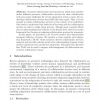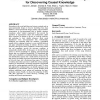45 search results - page 2 / 9 » Applying causal inference to understand emergent behavior |
CIG
2006
IEEE
13 years 11 months ago
2006
IEEE
— This paper develops an approach to the capture and measurement of the information contained in opponents’ bet actions in seven card stud poker. We develop a causal model link...
ATC
2008
Springer
13 years 7 months ago
2008
Springer
Dynamic collaboration environments in which team member utilize different pervasive collaboration services for their collaborative work pose many challenges for service adaptation....
AIPS
2000
13 years 6 months ago
2000
This paper develops Probabilistic Hybrid Action Models (PHAMs), a realistic causal model for predicting the behavior generated by modern concurrent percept-driven robot plans. PHA...
WSDM
2010
ACM
14 years 2 months ago
2010
ACM
This article describes an application of the partially observable Markov (POM) model to the analysis of a large scale commercial web search log. Mathematically, POM is a variant o...
KDD
2008
ACM
14 years 5 months ago
2008
ACM
Researchers in the social and behavioral sciences routinely rely on quasi-experimental designs to discover knowledge from large databases. Quasi-experimental designs (QEDs) exploi...


